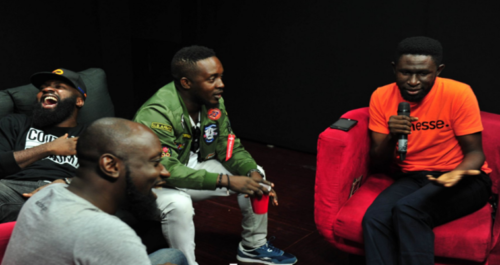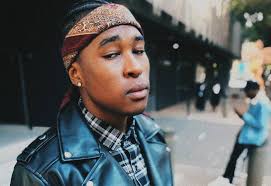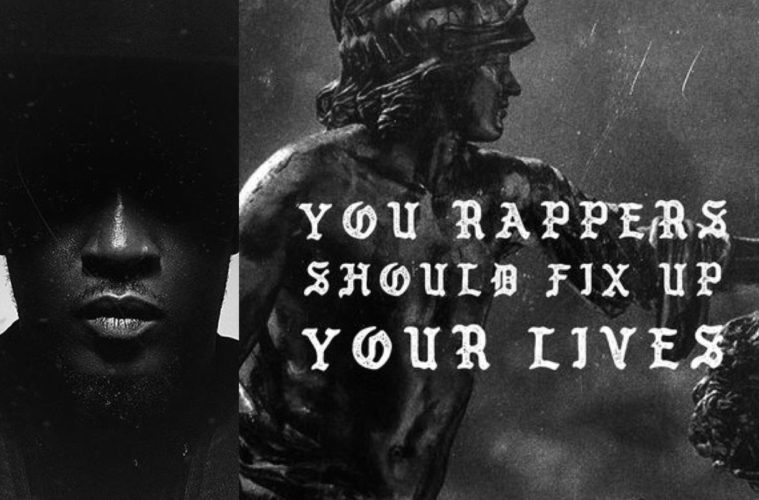I’m conflicted about M.I.’s controversial comeback single “You Rappers Should Fix Up Your Lives”. I’m talking about I-want-more-equity-for-Igbo-people-but-I-don’t-support-Nnamdi-Kanu kind of conflicted. I’m talking Bill-Cosby-might-have-raped-all-those-women-but-I-still-love-the-Cosby-Show kind of conflicted.
On the one hand, I’m grateful that M.I. is sounding sharp and rapping about the types of things many Nigerian hip-hop heads have been complaining about for years, but on the other hand, I wonder if he is in the best position to say them, especially right now.
I’m now convinced that if Nigerian hip-hop was a nation, and MI was the leader, he would love nothing more than to to muzzle the press and clamp down on freedom of speech. During his epic interview on Loose Talk podcast just weeks ago, MI opined that journalists and critics ought to sit with artists, pay attention to their struggle and feel their pulse, no pun intended, before writing stories about them.

MI and Loose Kaynon on Loose Talk (Pulse)
So, after listening to him generally dismantle his colleagues so mercilessly, my first question is: did M.I. travel round the country and sit with every Nigerian rapper to find out why they aren’t out here living their best lives? My second question is: is it now okay to call out under-performing artists again, or is emperor M.I. the only one allowed to do so?
Also, with a searing opener like:
I should be close to retirement /
A couple more years be retiring /
But none of you rappers is firing /
None of you pass the requirement /
I can’t retire yet… Damn /
Who’s gonna fix the environment?
M.I. seems to be laying the blame of the sorry state of hip-hop squarely at the foot of his colleagues. I take his point, but that’s not the full picture.
Nigerian hip-hop needs a lot more things fixed than the rappers can do themselves, blogs need to fix up, radio and TV need to fix up, corporate bodies need to fix up, award shows need to fix up, even fans need to fix up.
That said, I hear a lot of MC’s talk about how making it in Nigeria is ‘so difficult’, forgetting that making it big in ANYTHING was never supposed to be an easy task! It wasn’t easy for M.I., it won’t be easy for any MC. If anything, with the way the internet is constantly leveling the playing field, it’s even easier for your music to be heard in 2017 than it was for M.I. when he started.
They may not be hip-hop artists, but we can learn a lot from the way Mr. Eazi, Maleek Berry and to a far lesser extent, Nonso Amadi bypassed traditional gatekeepers and created a demand for their music primarily through the Internet. No one owes Nigerian rappers 4 seconds to listen to their songs, the same way I’ve had to earn the right for you read this article up till this point, they have to earn it.
Many rappers have turned away from this challenge, taken the path of least resistance, and left rap to become sub-par singers. They now use the need to survive as an alibi to justify that decision. Survival isn’t the best environment for great art – never has, never will. Rappers like M.I., who’ve worked hard to achieve financially stability and to take charge of their careers at an executive level, therefore have the liberty to make the records they truly want to make, the rest will continue to do anywhere-belle-face music, sadly.
None of you rappers is real enough /
Once you blow up, now you’re switching up /
That’s why these fans are not feeling y’all /
SA rappers out here killing y’all
But M.I. is also culpable in this way of thinking too; he has been an executive for several years now – from heading Loopy Records to leading Choc City – so not only has he been able to lead the change through his own music, M.I. has had the executive power to enforce some of the pain points on “Fix up” with those under him.
There is no doubt that M.I. has been more than instrumental to the development of hip-hop in Nigeria, particularly in the past decade: he’s given rappers the blueprint on how to balance critical acclaim and commercial success, he has released 6 important solo rap projects in 8 years, he introduced the world to one of the most influential rap crews of all-time, Choc Boys. M.I. has signed aspiring rappers and given even more a platform on his mixtapes, I can go on and on.
I’m doing this for the culture, you need somebody to coach ya, y’all need the truth /
Clark Kent, Clark Kent… we need Superman, so I had to get in the booth /
We out here getting massacred, this is the General calling to check with the troops /
I made this shit easy for y’all, you’re messing up my alley-oop
But for all he has done for the culture, M.I. hasn’t always had that same pro-rap energy around him. Again, on the Loose Talk podcast, in defending some of his lyrics on The Chairman album, M.I. implied that rappers write wack rhymes not because they want to but because the majority of their Nigerian audience struggle with English. So my third question is, did the education system suddenly get revolutionized overnight?
How come we don’t hear any bars? /
Omo, streets dey yarn say rappers no dey blow again
Also, besides the adaptation in his own sound, recall that as the leader of the Choc Boys, M.I. watched on as Ice Prince alienated his once strong fan base and became a painfully unrelatable pop star. Furthermore, it is evident that Jesse Jagz made some of his most lyrically intelligent music away from the Choc City fold, and that Dice Ailes has evolved from the confident rapper on “Oh No” to become that same opportunistic singer M.I. was complaining about:
Rappers are singing now just to get popular… yuck! /
I just be watching like I’m at the opera /
I should have brought my binoculars /
Cos I don’t see nobody dope /
I don’t see nobody great /
I don’t see nobody serious about taking my place
M.I. will also be questioned on why the VP of Choc City and his right-hand man, Loose Kaynon, who at a time was considered one of the sharpest lyricists in the country, now treats his rap career like it’s a civil service job, and no longer hosts his popular hip-hop show Wax Lyrical. And on why his former protege Milli repeatedly accused the label of trying to change his sound to become more ‘street’. M.I. has never truly addressed those allegations, so even though he has found his microphone on “Fix Up”, the blood of a dying genre that M.I. helped to strengthen is trickling down his hands, even as he holds it.
When Milli exited Choc City last year, one of the artists he formed an alliance with was PatrickXxLee – a Zimbabwean artist/producer based in Jo’burg.

PatricKxxLee
PatricKxxLee produced “Fix Up”, and it’s obvious that now that Milli and MI have patched up their relationship, the veteran MC has a lot of young energy from these guys around him to keep him inspired.
On “Fix Up”, M.I. rapped about how ‘the South’ was eating Nigerian hip-hop alive and employed a faux-South African accent in the way he stressed that:
I’m still the one that you loook to /
You need me to figure shit out
There is no doubt that SA hip-hop is running laps around Nigerian hip-hop right now, and I don’t mean in terms of skill, but in terms of vibrancy, accolades and how big their rappers have become outside of SA. The irony of having an act from that scene produce a song praising their dominance and challenging your countrymen to do better, therefore can’t be lost on us. It’s a similar thing to if JAY-Z had released “Death Of Autotune” and had T-Pain singing on the hook.
Just like Jay has done repeatedly, M.I. is stepping up to the plate and leading the culture. If my support is worth anything, then I’m behind him. But athough Nigerian hip-hop is going through a lean spell, M.I. is overlooking a lot of the progress that has been made. There are still some MC’s on the periphery doing the Lord’s work. Illbliss remains Mr. Consistent after all these years, while Show Dem Camp reinvented themselves superbly in 2017. Also, after their back and forth, Terry squared up to Ikechukwu with bars, and could have ignited a rap battle if Killz had responded. Besides the vets, Boogey remains, well, Boogey, D-Truce has leveraged Rap Kulture to get a buzz going, Lord V continues to be the unofficial, uncredited slang generator for Nigerian pop culture – not to mention that indigenous rappers haven’t gone anywhere. There’s a lot happening, if you pay attention.
Which, ultimately, I feel is one of the goals of this song – M.I. is forcing everyone to pay attention.
Y’all should be slapped in your face /
This is your big homie telling you niggas to wake
“Fix Up” will excite the culture, wake the fans and inspire competition among artists, in the same way that Kendrick Lamar did with his “Control” verse. And with all the responses coming out on nearly an hourly basis since Friday, it already has.
I’m sure that M.I. was strategic enough to anticipate those responses, as well as the so-called think pieces, like the one you’re reading right now. I’m also sure he knows he’s a living, rapping target going forward. But I’m even more sure that he’ll capitalize off this buzz to release a new project.
However, a positive reaction to “Fix Up” and all that follows it isn’t a given, this move could easily backfire. That’s why, in releasing a song this polarizing, M.I. is courageous in leading from the front and forcing the change a lot of us want to see. Despite all his shortcomings, you can’t help but respect Mister Incredible for that.


